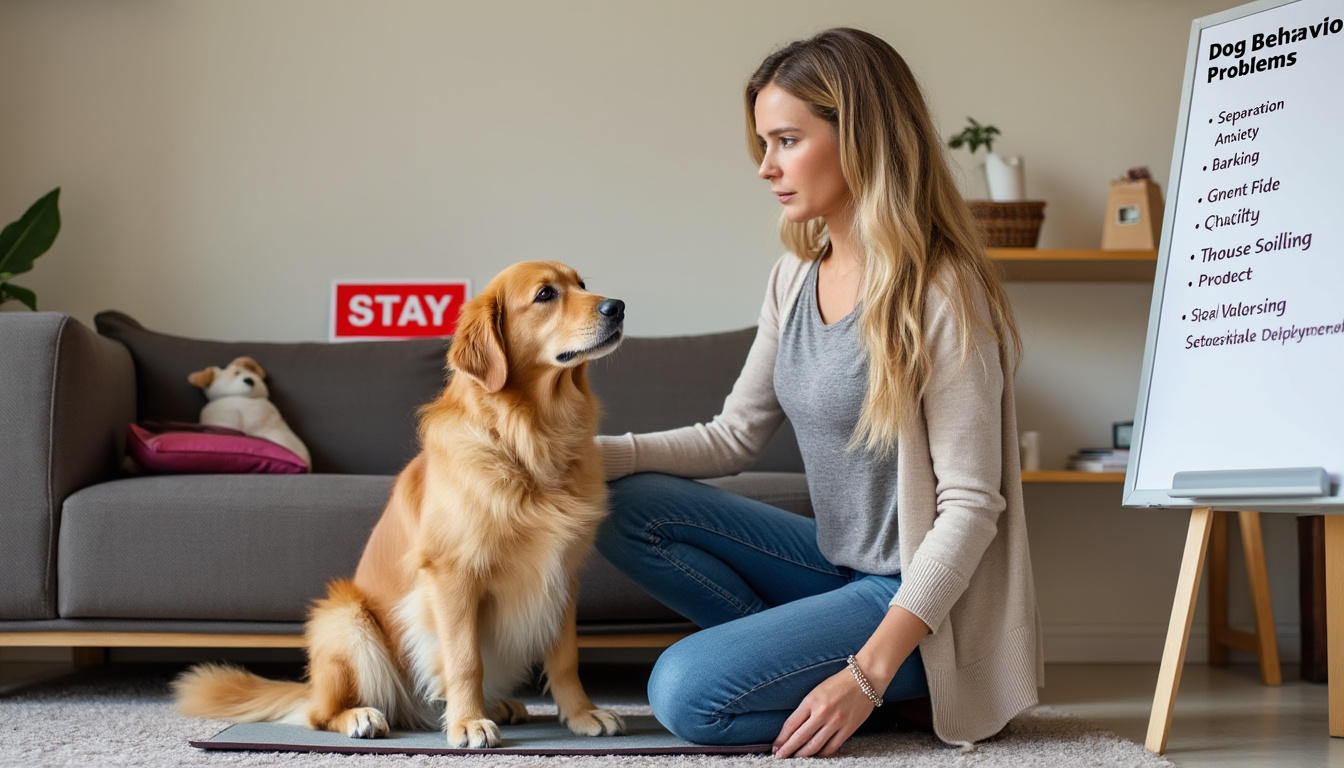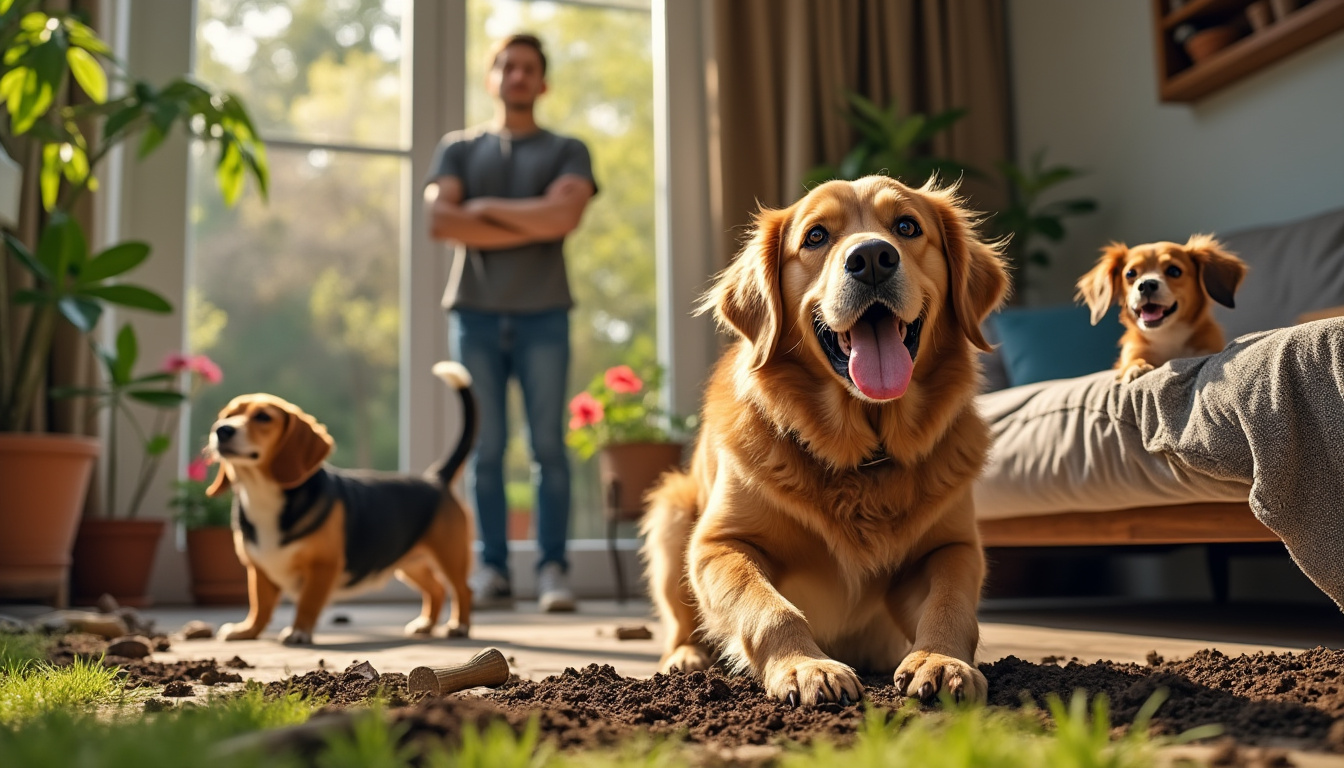What are the problematic behaviors in dogs?
Problematic behaviors in dogs are a source of concern for many owners. They can manifest in various forms, ranging from aggression to separation anxiety. A thorough understanding of the causes of these behaviors can help correct them effectively. Environmental factors, training, and health all play a crucial role in the development of these disorders. Through this article, you will discover how to identify the main problematic behaviors such as excessive barking, destruction of the home, and hyperactivity, as well as practical solutions to address them.
Understanding Problematic Behaviors in Dogs
Canine behavior is influenced by various elements, such as the living environment, education, and the physical and mental health of the animal. When a dog exhibits problematic behaviors, it is essential to analyze these factors to target the root causes and provide appropriate solutions.

Environmental Causes
The dog’s living environment is of vital importance. A noisy environment can cause stress in animals, leading to undesirable behaviors. For example, a dog subjected to frequent noise disturbances may develop separation anxiety or become aggressive towards its peers. Moreover, abrupt changes in its environment, such as moving or the arrival of a new person, can disrupt its daily life and affect its behavior.
Educational Gaps
Another crucial factor concerns education. Training issues can arise if the dog has not been properly trained. Inconsistencies in household rules, such as alternating between reprimands and rewards, can create confusion for the animal. The lack of discipline and teaching of good manners often leads to undesirable behaviors such as destruction, excessive barking, or aggression.
Main Problematic Behaviors in Dogs
When we talk about dog behaviors, certain disorders frequently recur. Understanding these behaviors represents an essential step towards implementing correction strategies.
Aggression in Dogs
Aggression is one of the most frequently encountered problematic behaviors. It can be driven by fears, a need to protect its territory, or even frustration. A territorial dog often defends its space against strangers, whether human or animal. Furthermore, early socialization is crucial, as a lack of contact with other dogs can exacerbate these behaviors. To address aggression, it is essential to identify the source of the problem, whether it be fear or, to a certain extent, annoyance.
Excessive Barking
Excessive barking is another common issue. While it is a normal means of communication for dogs, when it becomes incessant, it can pose problems. Stress, boredom, or a need for attention can all be underlying causes. Proper management of the environment can help mitigate this behavior, as can appropriate training.
Hyperactivity in Dogs
Hyperactivity can also manifest as excessive behavior, sleep disturbances, and a constant need to occupy the human. This often occurs when a dog is under-stimulated physically and mentally. It is recommended to increase the dog’s physical activity, but also to incorporate brain games into its daily routine.
Solutions to Correct Problematic Behaviors
Addressing problematic behaviors in dogs requires a varied approach that takes each situation into account. Several strategies can be implemented, tailored to each dog and its specific context.
Positive Training
The positive training method proves very effective in encouraging good behaviors. By using rewards such as treats, games, and petting, the owner can motivate the dog to adopt better behavior. Avoiding severe reprimands and favoring positive reinforcement fosters a bond of trust between the animal and its owner. It also reduces separation anxiety, as the dog will associate absence with a positive period.
Consultation with a Professional
When problematic behaviors persist, it may be necessary to consult a dog trainer or a professional behaviorist. These specialists can provide tailored solutions, ranging from specific desensitization techniques to learning strategies. The dog’s socialization also plays a crucial role, allowing it to get used to different stimuli and other dogs.
Environmental Management and Mental Stimulation
To prevent boredom and behavioral problems, it is essential to properly manage the dog’s environment. Installing engaging activities and toys can make a notable difference. Stress-relief devices for dogs, such as suitable chew toys, can also help lessen anxiety and manage destructive behaviors.
| Problematic Behavior | Possible Causes | Solutions |
|---|---|---|
| Aggression | Territorial protection, fear | Socialization, positive training |
| Excessive Barking | Stress, boredom | Environmental management, mental stimulation |
| Hyperactivity | Lack of exercise, stress | Regular physical activities, interactive games |
Preventing Problematic Behaviors in Dogs
Preventing problematic behaviors in dogs is always better than curing. By ensuring that training starts at an early age, owners can minimize the risks of future problems. Early socialization, clear rules, and a stable routine are fundamental to the well-being of dogs.
Importance of Early Training
By teaching the basics such as cleanliness, autonomy, and simple commands like “sit” or “no,” owners lay the groundwork for good coexistence. Socialization with other animals and humans is also critical for promoting good overall behavior. This helps build a balanced and confident personality, which reduces future undesirable behaviors.
Physical Activities and Mental Stimulation
Proper physical and mental stimulation is essential to avoid boredom and problematic behaviors. Regular activities such as walking, agility games, and trick training sessions can make a significant difference in a dog’s behavior. Many owners also find success using interactive toys that challenge the dog’s mind.
Maintaining a Stable Routine
A daily routine is crucial for a dog’s mental well-being. The presence of a regular schedule for meals, walks, and playtime reduces stress and anxiety. Dogs love predictability, and it helps them feel secure in their environment.













